Surrogacy is a complicated issue – the demand for surrogacy services certainly indicates that while there have been so many well-financed pressures to get rid of babies, there is also a strong global demand to acquire babies. Surrogacy is big business.
A recent drama on BBC TV, The Nest, broadcast in April, portrayed a wealthy Scottish couple desperate for a child. By chance, they happen upon a troubled teenage girl who is willing to act as surrogate for them – for £50,000. Because the regulations are so bureaucratic in Scotland, they travel to the Ukraine to organise the conception, which is accomplished with few questions asked.
That was the first I knew that the Ukraine is now something of a world hub for providing surrogacy for couples, both heterosexual and homosexual. But so it is. The BioTex Center for Human Reproduction in Ukraine will do a surrogacy deal for the quite modest price of €9,900. Ukrainian women act as surrogate mothers for ‘commissioning’ couples from all over the world. The commissioning couples can be assured that the Ukrainian-born babies will be white.
But now the coronavirus has prompted a potential tragedy with the Kiev reproductive company. According to the New York Times, at least 100 new-born babies have been left uncollected because the commissioning parents are unable to travel to collect them.
Another news source, the online Remix website, claims that the number could be up to 500 infants. According to Grzegorz Górny, the local reporter, over 40 swaddled newborns have been left ‘abandoned’ and crying in their cots.
Further financial problems arise as the Ukrainians are not happy about having to support these infants indefinitely.
Emergency
Some effort is being made, internationally, to allow the commissioning parents to travel to Kiev, spending time in quarantine. Certainly, there should be an international emergency action to rescue the infants – as everyone knows, the first few weeks and months after birth are crucial for one-to-one bonding.
Surrogacy is not regarded as ethically permissible by the Catholic Church, and feminists, too, are often opposed to it – on the grounds that it is hiring another woman’s body for money. But here’s the dilemma: once the baby exists, there is surely a moral requirement to extend love and care. The rescue of the surrogate babies is entirely aligned with a pro-life mission, as well as a humanitarian one. Simply because it’s a pitiful situation – and it can’t be in the child’s best interests to be left swaddled and crying in a clinic’s nursery ward.
The Nest brought out the psychological complexities involved in surrogacy: the volatile emotions between the ‘commissioning’ couple, Dan and Emily, and the unreliable teenager, Kaya, who has herself had a problem background – let alone the entanglements of money and power.
A rather patched-up happy ending is provided in the story, but it’s evident there could be trouble down the line.
Surrogacy is indeed complicated. The Ukrainian situation illuminates that in no small measure.
***
During this lockdown period, I’ve been perusing the early Irish saints as a way of examining our roots, and the strong links between holy men and women and geographical location, as itemised in O Riain’s scholarly Dictionary of Irish Saints. As we are moving towards exiting the lockdown, I’ll bring this regular item to a close with mention of St Conall of Inishkeel, Co. Donegal, who, on a pilgrimage to Rome, was given the Law of Sunday, to be brought back to Ireland.
He became a saint through penance for an earlier homicide. Conall’s bell is now in the British Museum, and his traditional feast day is May 22.
***
President Trump [pictured] has caused shock and disapproval by saying that he takes the anti-malarial drug hydroxychloroquine as a protection against the coronovirus. Some experts say it’s not proven to work, and a run on the drug could deprive people who really need it for malaria. Mr Trump’s own doctor advises him it isn’t doing any harm.
There’s an ‘anti-malarial’ drug that was always widely used by travellers (and journalists) going to Africa and India. It was called ‘gin and tonic’. The users swore that the quinine in the tonic and the juniper in the gin were an excellent defence against malaria.
I’m sure they’re now swearing it’s a defence against Covid-19!


 Mary Kenny
Mary Kenny President Donald Trump
President Donald Trump 